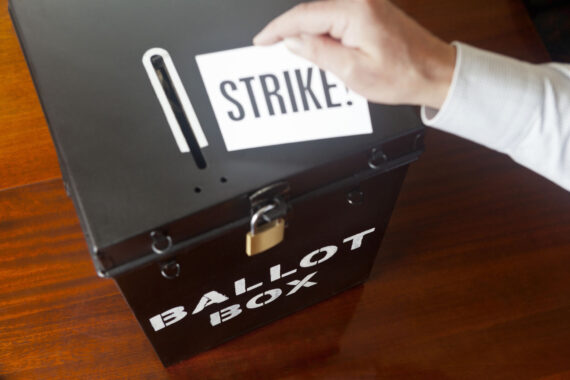Exclusive GP collective action will have ‘a detrimental effect’ on services, NHS England’s director of primary care has stated.
In an opinion piece for Pulse, Dr Amanda Doyle said that while she knows that GPs ‘would never intend to take action that would impact patients’, it is ‘hard to see’ how this action ‘will not have a detrimental effect’.
Yesterday, the BMA announced the results of its non-statutory ballot, which saw 98.3% of GP partners voting in favour of taking collective action from 1 August, in protest against contractual terms and funding.
It is up to GP practices to choose which action to take out of 10 options outlined by the BMA, including limiting patient contacts to 25 a day per GP; refusing to engage in advice and guidance; and declining to sign new contracts with NHS England or the local ICB.
Dr Doyle said: ‘I know that GPs would never intend to take action that would impact patients, but it is hard to see how this action will not have a detrimental effect.
‘We want to work with you to make general practice fit for the future – for you and your hard-working teams and for our local communities who need our help every day.’
She added that general practice has been ‘under huge pressure in recent years’ but that this week NHS England and the Government ‘have made some important first steps to delivering the change that GP teams need to see’.
She said: ‘Firstly, on pay, the Government earlier this week accepted the DDRB pay recommendations to deliver a 6% increase in pay – the first meaningful increase for several years and three times what the profession was offered when the ballot for collective action was called.’
NHS England said it will work with the Department of Health and Social Care and the BMA’s GP Committee to update the Statement of Financial Entitlements (SFE) so the uplift ‘can be passed on to practices as soon as possible via global sum’.
In an ‘emergency measure’ announced by the Government yesterday, the additional roles reimbursement (ARRS) scheme will now include GPs, in the hope practices will be able to hire 1,000 more doctors this year.
Dr Doyle said she was ‘delighted’ that GPs have been included in the scheme, and added: ‘This was the single biggest ask that we heard from GPs over the last year, including the petition signed by thousands of practices and supported by the RCGP and the BMA GP Committee.’
It comes after earlier this year, NHS England said it would not add GPs to the scheme because ‘they are not additional’, while the BMA’s GP Committee argued for the inclusion, saying it could be ‘an obvious solution to practices’.
Dr Doyle added: ‘I understand that many would prefer that this funding was targeted at practices, but this approach will ensure that the additional funding will be ring fenced solely for employing additional GPs.’
Yesterday, NHS England said ICBs should make sure that GP practices are continuing to meet contractual requirements during collective action.
ICBs and trusts were also to prepare for an impact on the whole system should GP practices decide to take collective action.
And, earlier this week, NHS leaders warned that GP collective action could have a ‘catastrophic’ impact on A&E and other NHS services.
Read the full opinion piece here















Dr Amanda Doyle suddenly wants to be working ‘with GPs’, bit yet, she was appointed by the previous, disgraced and dishonest government and back then she appeared happy to be crushing GPs with underfunding and work dumping from her secondary care departments. I am not sure we would all see her current soundbites as warm, especially when it is not clear if they are actually veiled threats and insults about harming patients.
Limiting numbers of appointments to safe levels, refusing non contractual work, resisting unfunded work shift from secondary to primary care, only doing additional or enhanced services if we have the time, skills and resources. These things are no industrial action. They are simply common sense and we should all be doing them anyway.
Industrial action consisting of literally “just doing our job” will have “a detrimental impact” on the system?
If the director of NHS England is unable to recognise that she has just made a very frank admission that the system relies on the exploitation of Practice staff to do free work outside of the boundaries of safety, now might well be the right time for her to step aside and find a more insightful successor!
Why is the previous government’s lackey still in post after the election?
Note that this is not a formal strike, and employees are not legally protected.
Failure of salaried staff to.meet their contractual obligation can be dealt with using standard disciplinary procedures.
What kind of weird Alice in wonderland world have we got ourselves into when simply doing whats in the job description is characterised as “going on strike”? I think this whole thing should be viewed more as a collective realisation that we should stop doing stuff we aren’t paid to do. This should be the new normal. Yes indeed Dave Haddock this is not a strike. I’m confused by your reference to “standard disciplinary procedures” ..where does this fit? This isn’t a strike. It’s just doing whats in the contract. Its practicing safe medicine. The former is our legal, and the latter, our moral, obligation.
Perhaps she should be investigated by the GMC for encouraging unsafe practices which put patients at risk.
Completely agree with Simon Braybrook. We must be very careful adopting these measures as part of the “action” as it implies that when the “action” is over we will no longer do these. We do pretty much most of these already, so for us it’s business as usual.